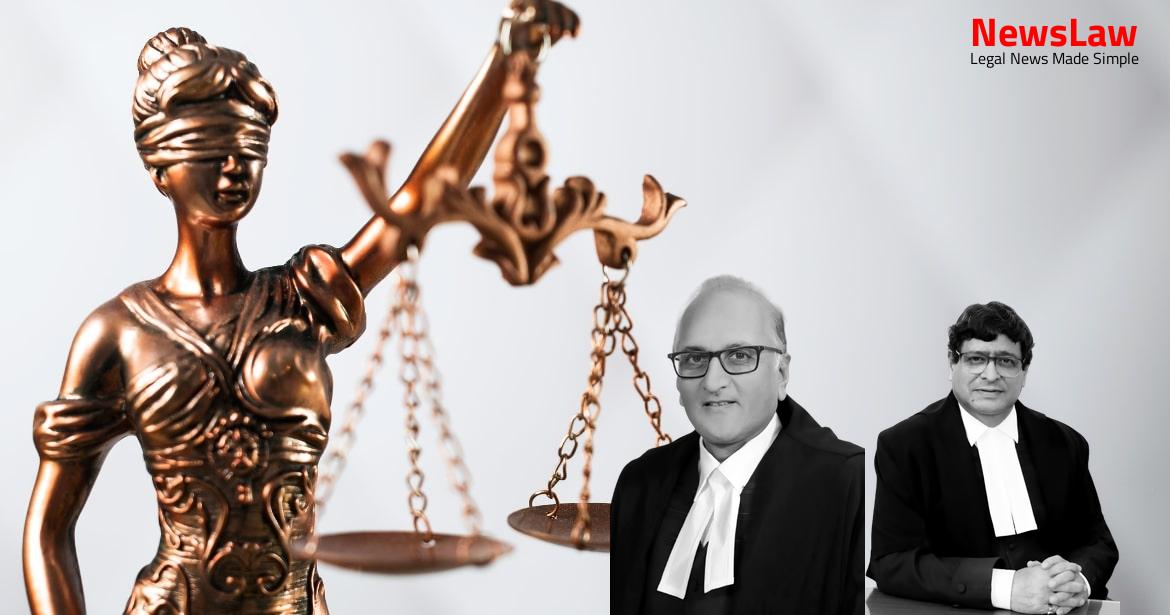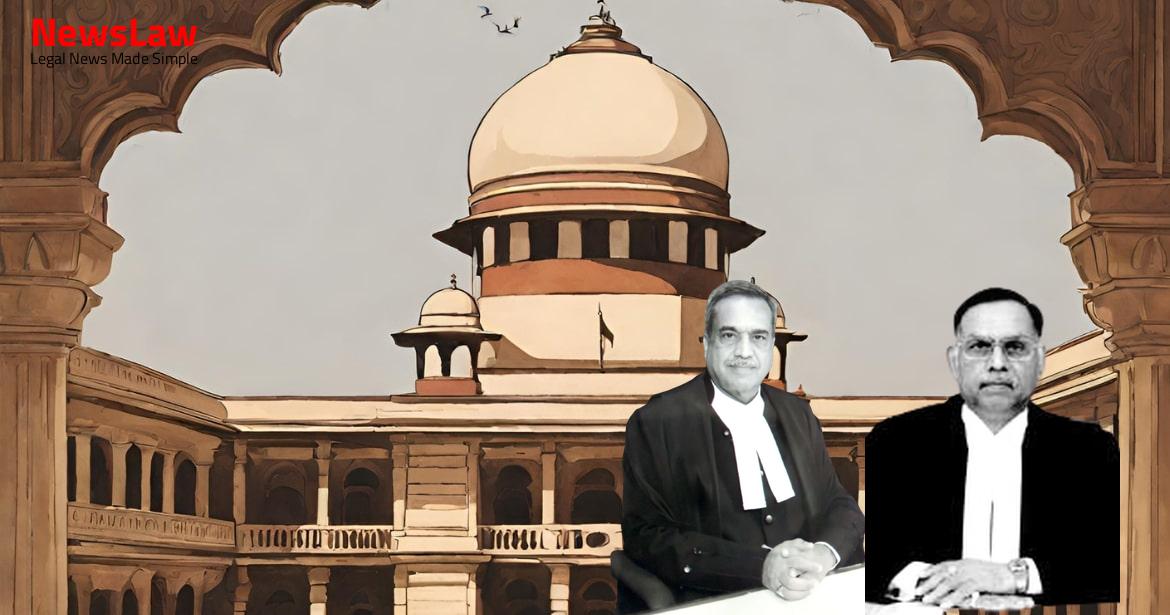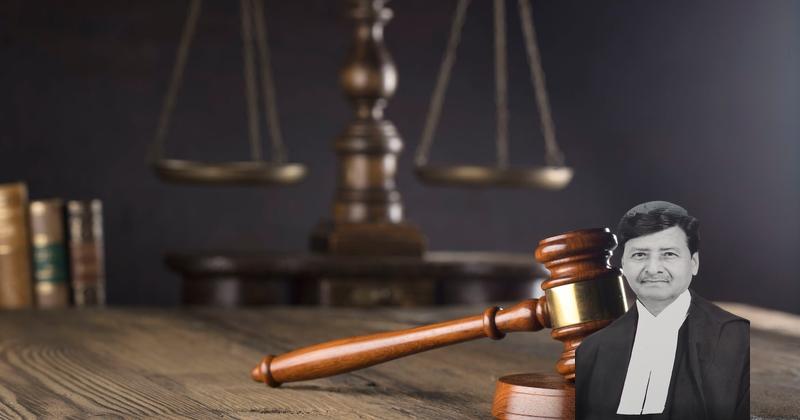This legal case delves into the court’s detailed evaluation of mental cruelty within the context of marriage. The High Court’s examination of cruelty as the core dispute and its critical analysis of the wife’s complaints to various authorities provide valuable insight into the legal considerations surrounding matrimonial relationships. The judgment emphasizes the need for a nuanced approach to assessing allegations of mental cruelty in marital disputes, setting an important precedent for future cases.
Facts
- The High Court examined the issue of cruelty as the core dispute in the case.
- The wife’s complaints to various authorities, including the Army’s top brass, were considered in relation to the husband’s plea for dissolution of marriage.
- The Division Bench found that the complaints made by the wife did not constitute cruelty as they were not proven to be false or fabricated.
- The Court viewed the conduct of the parties towards each other as typical of ordinary middle-class married life and not extreme cruelty.
- The High Court allowed both appeals by reversing the Family Court’s order, granting the respondent’s petition for restitution of conjugal rights.
- The judge concluded that the respondent failed to prove her allegations of adultery against the husband but had subjected him to mental cruelty with her complaints to the Army and other authorities.
- The appellant applied for divorce from the Family Court at Vishakhapatnam after estrangement.
- The respondent filed a petition in the Dehradun Court for restitution of conjugal rights against the appellant.
- The respondent later filed a Transfer Petition No 1366/2011 before the Court upon learning about the case filed by the appellant.
- The transfer petition was disposed of with an observation that any petition filed by the respondent in Dehradun should be expedited without undue delay.
- The couple got married in 2006 and lived together in Vishakhapatnam and Ludhiana briefly.
- They have been living apart since 15.9.2007 due to differences.
- The respondent pleaded for the resumption of the matrimonial life.
- Both parties presented their cases in the respective courts, with the appellant being an Army Officer with an M.Tech qualification and the respondent being a faculty member with a Ph.D.
- The appellant claimed to have faced mental cruelty due to malicious complaints by the respondent impacting his career and reputation.
- A statement was made at the Bar indicating that the appellant would withdraw the case in Vishakhapatnam as part of a resolution.
Also Read: Insurance Claim Repudiation due to Fire Incident: Court’s Legal Analysis
Arguments
- The respondent filed multiple complaints against the appellant with the Army authorities.
- These complaints have severely tarnished the reputation and mental peace of the appellant.
- Efforts made by the wife to preserve the marital relationship should be understood.
- The appellant cannot be compelled to resume matrimonial life with the respondent due to unfounded allegations and cruel treatment.
- The matrimonial life between the appellant and respondent lasted only a few months and they have been separated since 15.9.2007.
- Restitution of conjugal rights would not be justified or feasible after such a long separation period.
- The respondent expressed her desire to resume matrimonial life with the appellant, claiming her actions were to assert her legal rights as the married wife.
- The letters and complaints filed by the respondent were a response to the appellant filing for divorce in Vishakhapatnam Court.
- The respondent felt compelled to write to various authorities to assert her rights as the legally wedded wife due to the ex-parte order obtained by the appellant.
Analysis
- In Samar Ghosh Vs. Jaya Ghosh, the Court provided illustrative cases where inference of mental cruelty could be drawn.
- The Court emphasized that no uniform standard can be laid down and each case must be decided on its own facts.
- The instances of mental cruelty were highlighted at the instance of a spouse alleging such behavior.
- The High Court’s decision to not provide relief to the wronged spouse without a definite finding on the credibility of the wife’s allegations is criticized.
- Reputation damage to the appellant’s career and social status was significant.
- The level of tolerance for mental cruelty varies among couples and must consider education and status.
- Allegations made by a highly educated spouse can irreparably damage the character and reputation of the appellant.
- To constitute mental cruelty, the result must be such that continuation of the marriage is impossible.
- The respondent made defamatory complaints to various authorities against the appellant, impacting his career adversely.
- The wife’s explanation that complaints were made to protect matrimonial ties does not justify undermining the appellant’s dignity and reputation.
- The respondent’s actions led to a Court of Inquiry by Army authorities against the appellant.
- The court held that the plaintiff was expected to condone the conduct of the defendant and continue living with their spouse.
- The expectation of condoning such behavior was deemed necessary for the continuation of the marriage.
- The court did not find sufficient grounds for a dissolution of the marriage based on the presented evidence and circumstances.
- The High Court erred in considering the broken relationship as normal wear and tear of middle-class married life.
- The case involved cruelty inflicted by the respondent against the appellant, justifying the seeking of separation.
- The High Court’s judgment is set aside, and the order passed by the Family Court is restored.
- The appellant is granted dissolution of the marriage, and the respondent’s application for restitution of conjugal rights is dismissed.
Decision
- The appeals have been disposed of.
- The parties will bear their own costs.
Case Title: JOYDEEP MAJUMDAR Vs. BHARTI JAISWAL MAJUMDAR (2021 INSC 123)
Case Number: C.A. No.-003786-003787 / 2020



